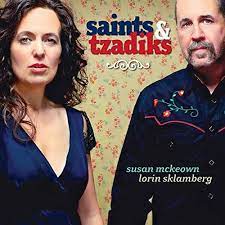 Patrick O’Donnell wrote this review.
Patrick O’Donnell wrote this review.
The German-Jewish poet Berthold Auerbach said “Music is a universal language, and needs not be translated. With it soul speaks to soul.” Perhaps Susan McKeown and Lorin Sklamberg had that in mind when they recorded Saints & Tzadiks, a Gaelic-Yiddish-English collaboration that dares you to find a niche under which to file it.
At first blush, the Celtic and Yiddish musical traditions might seem as far from one another as Israel and Ireland. The different twists of the tongue required for each language surely seem like a knot waiting to happen. But somehow, McKeown and Sklamberg weave their voices together, their verses twisting and swirling like dancers around a maypole, the lyrics darting and fluttering like kites in a gale. The end result is nothing short of a melting pot worthy of Ellis Island.
McKeown, who practically reinvented traditional Celtic music, and Sklamberg, lead singer of the genre-bending group The Klezmatics, meld songs with themes common to almost any culture on earth: love, desire, betrayal, pride, war, drink, life and death. And by doing so, they prove that music really does transcend language: soul speaking to soul.
This CD is essentially their second collaboration in three years. In 2006, McKeown worked with the Klezmatics on the Grammy-winning album Wonder Wheel. But don’t go looking for much common ground between the two works. While Wonder Wheel was based on lyrics by Woody Guthrie, Saints & Tzadiks is rooted in much older and rarer stock.
According to the duo’s Myspace page, “the bulk of the Jewish material is being drawn from the papers of the legendary collector and performer Ruth Rubin … drawn from her field recordings held at the YIVO Institute for Jewish Research, where Sklamberg serves as Sound Archivist.” The Celtic material was culled from popular and ancient traditional Irish music. With the exception of just a few tracks, the pair then worked together on the arrangements.
The 12-track CD clocks in at just over 48 minutes, and the jacket is complete with lyrics in Yiddish and Gaelic, and, luckily for me, translations into English.
The first track, “Heart’s Blood,” sets the tone for the rest of the album. It’s a blend of German and Scots versions of what is essentially the same song; Sklamberg’s plaintive tenor opens the door with a Yiddish adaptation of “Der Grausamer Bruder” (“The Cruel Brother”); McKeown, singing in English, steps through on the next verse with “A Young Man Rode Out.” The ballad is a tale familiar in any language: a man and woman of differing social status fall in love, but the woman’s brother disapproves. When he learns they’ve already had a child together, he takes matters in his own hands and kills her with a slip of a knife.
The next track, “Buenos Aires,” is another tale of woe: sung entirely in Yiddish, it tells the story of a young Polish woman sold into prostitution during World War I. The haunting lyrics detail her grief at being torn away from her home and her mother: “They took me away from my dear mother/And promised me things of gold/ They took me off to Buenos Aires/To make me into a prostitute.”
Later, McKeown and Sklamberg explore death and the horrors of war with a chilling blend of three songs: the 19th century Irish ballad “Johnny I Hardly Knew Ye”; a World War I Ukrainian song titled “Kh’bin oysgeforn felder, velder, oy vey!” (“I’ve traveled across fields and forests, oh woe!”) and the Latin/Gaelic dirge “Deus Meus Adiuva Me” (“My God come to my aid”). It’s a chilling arrangement, and one of the best works on the disc.
But the CD isn’t all doom and gloom. There’s “My Little Belly,” a fun, exaggerated version of a traditional Jewish rhyming song in which a child lists his ailments one by one. The English translation will give you an idea: “Oh, my little belly hurts!/In my little belly a soup is stirring itself/Oh my little head hurts!/In my little head a little apple is wallowing.”
There’s also a version of the humorous “Enniscorthy Fair,” in which a dimwitted father and son sell an old mare, then wind up buying her back later the same day, at a far higher price, thinking this “new” mare is a racehorse. When they arrive home with their prize, “Herself” lets it be known that she’s not at all pleased: “I’ll sit down at the table and I’ll let my temper cool;/I’ve been married to you these forty years and you’re only a born fool.”
By far my favorite, however, is the pair’s arrangement of “The Rattlin’ Bog,” and the Yiddish “Funem sheynem vortsl aroys” (“From the Lovely Root”). Sklamberg begins the song in Yiddish, which translates to: “From the lovely root/grew a lovely tree/tree from the root/root from the earth/since the creation of heaven and earth.” Later, McKeown adds: “Now on this tree there was a limb/a rare limb/a rattlin’ limb/limb on the tree/tree in the bog,/and the bog down in the valley-o …” The pair alternate verses in this cumulative piece, building on the bog and the root and the tree and the limb until the song comes full circle again.
Saints & Tzadiks is a unique and amazing work of aural art; full of unexpected delights and twists that will leave the listener wondering what’s next – and wondering how McKeown and Sklamberg put it all together without becoming tongue-tied. It’s by far one of the most original CDs I’ve heard in years. One can only hope it’s not the last pairing for this dynamic duo.
(World Music, 2009)
